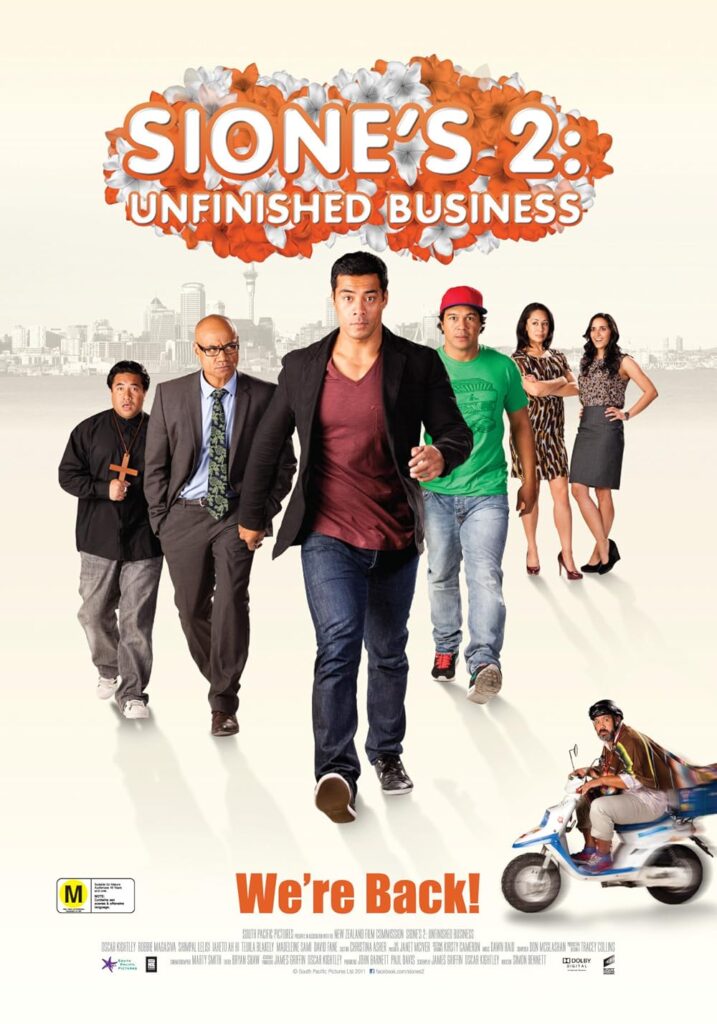
Director: Simon Bennett
Genre: Comedy
Runtime: 92 minutes
Language: English
IMDb Rating: 5.8/10
Plot: A Reunion of Friends Amidst New Challenges
Five years after the events of Sione’s Wedding, the Duckrocker boys—Albert (Oscar Kightley), Sefa (Shimpal Lelisi), Michael (Robbie Magasiva), and Stanley (Iaheto Ah Hi)—find themselves at different junctures in their lives. Albert is married to Tania (Madeleine Sami) but faces challenges in starting a family. Sefa and Leilani (Teuila Blakely) have two children but remain unmarried due to Leilani’s rejection of Sefa’s proposal. Stanley is training to become a deacon, and Michael has relocated to Australia. Their paths converge once more when their friend Bolo (David Fane) goes missing, prompting the group to reunite and navigate the vibrant streets of Auckland in search of him.
Sione’s 2: Unfinished Business brings the beloved Duckrocker crew back together for another round of laughter, chaos, and heartfelt reflection. Set against the colorful pulse of Auckland, the film captures how friendship evolves with age — messy, funny, and deeply real. Each character’s journey mirrors the growing pains of adulthood, from love and faith to the struggle for purpose. It’s the kind of spirited, culture-rich comedy that resonates on Goojara movies online, where audiences celebrate films blending humor with heart. Sione’s 2: Unfinished Business isn’t just a reunion; it’s a reminder that even when life pulls friends apart, true brotherhood always finds its rhythm again.
Visual Style: Capturing Auckland’s Urban Landscape
Director Simon Bennett effectively utilizes Auckland’s urban scenery to reflect the characters’ personal growth and the evolving dynamics of their friendship. The film showcases iconic locales such as Karangahape Road and Ponsonby Road, grounding the narrative in a tangible and relatable setting.
Cast: A Cohesive Ensemble Delivering Authentic Performances
Oscar Kightley (Albert): Reprises his role with a blend of humor and sincerity, portraying Albert’s journey through marital challenges and the desire for fatherhood.
Shimpal Lelisi (Sefa): Delivers a nuanced performance as Sefa grapples with commitment issues and the complexities of fatherhood
Robbie Magasiva (Michael): Brings depth to Michael’s character, highlighting the struggles of maintaining friendships across distances.
Iaheto Ah Hi (Stanley): Embodies Stanley’s transformation with authenticity, depicting his internal conflict between past antics and current aspirations.
Teuila Blakely (Leilani): Portrays Leilani with strength and vulnerability, showcasing the challenges of balancing personal desires with familial responsibilities.
Madeleine Sami (Tania): Adds layers to Tania’s character, navigating the pressures of societal expectations and personal ambitions.
David Fane (Bolo): Provides comic relief and depth, serving as the catalyst for the group’s reunion and subsequent adventures.
Themes: Exploring Maturity, Friendship, and Cultural Identity
The sequel delves into themes of maturity and the evolving nature of friendships. It examines how cultural expectations influence personal decisions and relationships, offering a humorous yet poignant commentary on the challenges of adulthood within the Polynesian community in New Zealand.
Reception: A Mixed Bag of Nostalgia and Critique
Sione’s 2: Unfinished Business received mixed reviews from critics and audiences. While some appreciated the film’s humor and the chemistry among the cast, others felt it lacked the freshness of its predecessor. The film holds a 46% audience score on Rotten Tomatoes, indicating a divided response.
The Critic’s Verdict
While Sione’s 2: Unfinished Business may not entirely recapture the charm of the original, it offers a heartfelt exploration of friendship and personal growth. The ensemble cast’s chemistry and the authentic portrayal of Auckland’s diverse culture provide an entertaining experience for fans and newcomers alike.
Rating: 6.5/10
An enjoyable sequel that balances humor with introspective themes, despite some narrative shortcomings.
Pair With
The Breaker Upperers (2018) for another dose of Kiwi comedy exploring relationships and personal growth.
Cultural Footprint
The film contributes to New Zealand cinema by highlighting Polynesian culture and addressing universal themes of friendship and maturity, resonating with a broad audience.
Addition
In addition to its exploration of friendship and personal growth, Sione’s 2: Unfinished Business delves deeper into the complexities of cultural identity within New Zealand’s Polynesian community. The film portrays how traditional values intersect with modern urban life, highlighting the challenges the characters face in balancing familial expectations with personal aspirations. This nuanced depiction resonates with audiences familiar with such cultural dynamics, offering both humor and insight into the Polynesian experience in Auckland.
Furthermore, the film’s soundtrack, featuring artists from the Dawn Raid label, enriches the narrative by infusing it with authentic Pacific sounds. This musical backdrop not only enhances the film’s atmosphere but also pays homage to the vibrant local music scene, further grounding the story in its cultural context. The integration of contemporary Polynesian music serves to bridge generational gaps, appealing to both younger audiences and those nostalgic for traditional melodies.
